#Preventative self-care
Text
Peace of Mind in Print: A Review of The Home Doctor
Living in a remote area, far from a hospital, has always made me prioritize self-reliance, especially when it comes to healthcare. That's why I decided to invest in "The Home Doctor" – a comprehensive medical guide specifically designed for home use. After a few months of browsing its pages and familiarizing myself with its contents, I can confidently say it's become a valuable addition to my household preparedness kit.
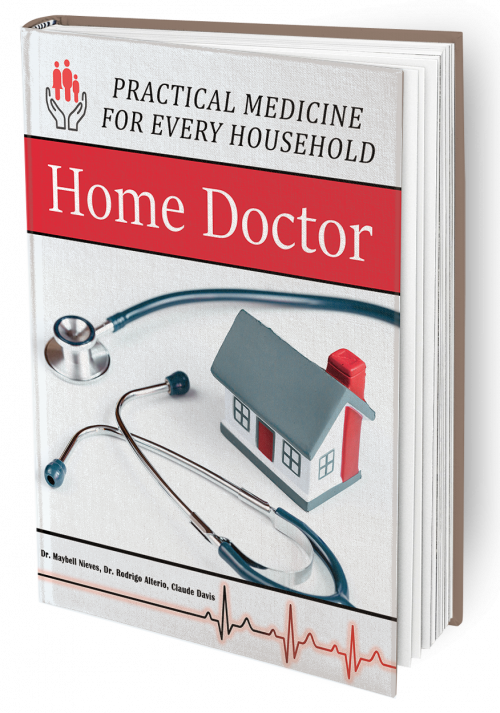
Empowering Knowledge for Everyday Ailments
"The Home Doctor" isn't a replacement for professional medical care. It is, however, a fantastic resource for handling common ailments and injuries at home. The book covers a wide range of topics, from treating cuts and scrapes to managing headaches, fevers, and even allergies. The clear instructions and illustrations make it easy to understand even complex medical procedures, giving me the confidence to handle minor emergencies until professional help arrives.
Beyond Band-Aids: Preparing for the Unexpected
What truly impressed me was the book's focus on preparedness for unforeseen circumstances. "The Home Doctor" includes sections on dealing with natural disasters, power outages, and even biological threats. It provides practical advice on creating a first-aid kit, stocking essential supplies, and even performing basic medical procedures in the absence of a doctor. This knowledge empowers me to feel more prepared for whatever situation may arise.
A User-Friendly Format for Easy Reference
The printed format of "The Home Doctor" is a major plus for me. Unlike online resources that require internet access, this book is always available, even during power outages. The clear layout, logical organization, and comprehensive index make it easy to find the information I need quickly, especially during stressful situations.
Focus on Natural Remedies and Self-Care
While "The Home Doctor" doesn't shy away from conventional medicine, it also emphasizes the importance of natural remedies and preventative self-care. The book includes information on using herbs, essential oils, and other natural remedies for various ailments. This holistic approach aligns perfectly with my belief in natural health practices.
Investing in Peace of Mind
"The Home Doctor" is more than just a medical guide; it's an investment in peace of mind. Knowing that I have access to this wealth of information allows me to feel more prepared and in control of my family's health, especially in situations where immediate medical attention might not be readily available.
Overall, "The Home Doctor" is a valuable resource for anyone looking to be more proactive about their health and well-being. It's a comprehensive guide that empowers you with knowledge and practical skills, all in a user-friendly format.
#Home medical guide#Self-reliance healthcare#Treating common ailments#Preparing for emergencies#First-aid kit essentials#Basic medical procedures#Printed book format#Offline medical information#Natural remedies#Preventative self-care#Peace of mind for families#Remote area healthcare#Disaster preparedness#Holistic health approach#Investment in wellbeing
0 notes
Text
You have to stop ruining things for yourself preemptively because you believe they’ll fail anyway. Give yourself a chance to succeed.
#forcing failure now will not prevent the pain of it#give yourself a chance to see a better outcome#suggestions#recovery#positivity#self love#mental health#self care#ed recovery#love#goals#life goals#daily life#hope#hopcore#believe in yourself#healing#study motivation#studyblr
9K notes
·
View notes
Text
hygiene tips for the girlies

-silk pillow cases have so many benefits for your skin and hair
-always moisturize after baths/showers
-rubbing ice on your face or using a cold jade roller can reduce face puffiness in the mornings
-bad breath? use a tongue scraper
-ALWAYS take ur makeup off before bed! trust you'll regret it if you don't
-cut ur nails often, to keep them healthy!
-wash your clothes before you wear them again, especially if they smell!
-don't wear pads/panty liners every day unless ur on ur period
-use a non scented soap down there, it prevents infections, it's also a self cleaning organ so you don't need body washes to make it smell nicer
-remember to clean behind your ears after u wash your hair. soap can build up there!
-roll on deodorant stays on longer and are the most effective
-drink more water than usual whilst on ur period!
-don't wear a sweaty bra the next day, wash it!
-NEVER dry shave!
-never wear bras to bed! it can cause damage to the breast tissue! if u want support wear a wireless bralette
-don't EVER sleep with tampons in, it's really dangerous
-wear 100% cotton underwear so the air can circulate down there
-for rapid hair growth, wash with rice water!
-invest in a body brush! it gets all ur dead skin off before showers


#hygiene#life skills#safety#prevention#that girl#self care#it girl#clean girl#pink pilates princess#coquette#vanilla girl#just girly things#cute
2K notes
·
View notes
Text
something my therapist told me and might help you through difficult times: your brain holds resistance to change. you've been doing something for so long now, to the point that's what you consider normal or routine. you wanting to change that for one reason or the other will be conflicting, and your system will probably make you feel like that's not what you want or need, but remember it's just your brain playing tricks on you. you're on the right path, sweet soul, keep it going. i love you.
#gentle reminder#note to self#advise#friendly reminder#reminder#reminders#selfworth#self healing#self esteem#self worth#self help#suicide prevention#self care#self guidance#guidance#self acceptation#acceptance#self acceptance#self compassion#compassionate#comfort#friend#mental health support#mental health#personal development#personal growth#love yourself#changes#advises#soft reminders
729 notes
·
View notes
Text
If you are reading this, you have survived your entire life up until this point. You have survived your traumas, your mental health, the heartbreak, the devastation, and the different phases of life and here you are. STILL ALIVE AND FIGHTING, I HOPE YOU ARE ABLE TO CONTINUE YOUR JOURNEY IN LIFE, JUST MAKE SURE THAT YOU, TAKE EACH MINUTE, EACH HOUR, OR EACH DAY AT A TIME. I BELIEVE IN YOU. STAY STRONG.
#mental health#mental illness#depression#anxiety#bpd#bipolar#ptsd#cptsd#trauma#traumatized#suicide#suicide prevention#mental wellbeing#positivity#reminder#self-care#self-love#self-improvement
2K notes
·
View notes
Note
what about yellow teeth? my teeth always stayed yellow and that + my poor mental health made brushing just so nightmarish



#Yellow teeth can be genetic#Also! This is what i meant by i hate the hollywood smile#Hollywood smile being perfect white teeth#Teeth arent MEANT to look like that. Its uncanny (to me)#Yellow teeth are normal <3#But but but it's important to do your best brushing!#Its not about whitening your teeth#its about the fact that fluoride helps enamel health and prevents cavities!#It may be difficult but its less difficult than avery expensive life with pain as a result! Remember! Its never too late!#Enamel cavities can even self-repair with enough time care and love!#Try disposable Toothbrushes you can keep by your bed#or toothpaste tablets!
491 notes
·
View notes
Text
depression room cleaning check!!!
I just did this myself so now you get to do it too
Take five minutes to set down your phone, stretch your legs, and do one of these tasks
1. Pick up all your dirty dishes from your room and take them to the sink/dishwasher
2. put your shoes back where they belong
3. move your dirty clothes off the bed and into the hamper (or wherever you keep them)
4. get a clean glass and fill it up with water. Take a drink
5. open the blinds or curtains (or even better, stand outside)
6. floss and brush your teeth
7. wash your face. Soap is absolutely fine, don’t let the internet tell you otherwise
8. collect all your trash from your room (water bottles, old papers you’ve been meaning to throw out, take-out boxes, etc) and throw it away
9. change your clothes all the way down to your underwear
10. go to your fridge and pull out any items that might be old
11. make your bed so all your stuffed animals will be comfortable until you get back
Don’t feel like you have to do all of these, just pick one (or even just plug them into a random number generator and have the universe pick one for you)
#self care#will this actually help anyone? maybe not#but it is a good concrete list for me when I’m feeling overwhelmed#so maybe it will help you too#anyway#sometimes self care is doing hard stuff#like calling the doctor or going to the dentist or PREVENTATIVE CARE#you know budgeting your money#stuff like that#but what do I know I didn’t study it#i’m just a little guy
212 notes
·
View notes
Text
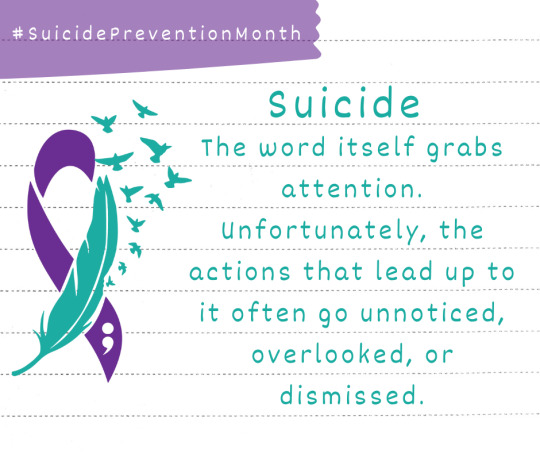
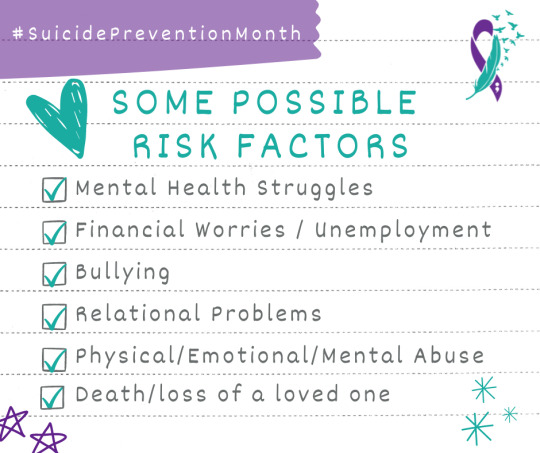
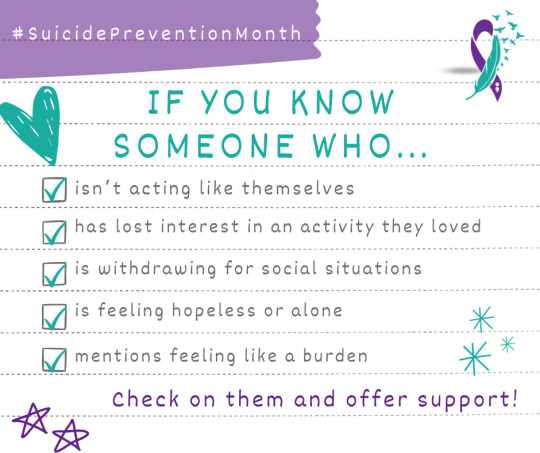
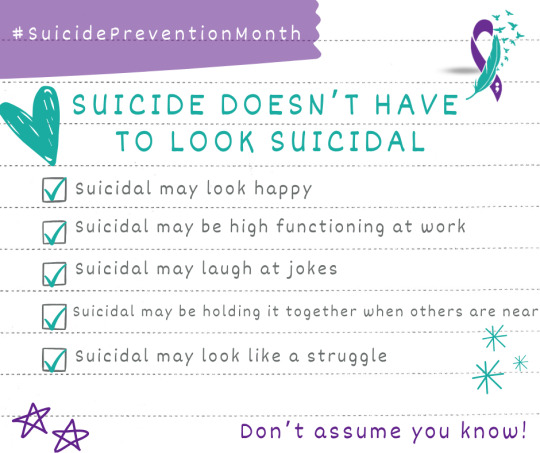
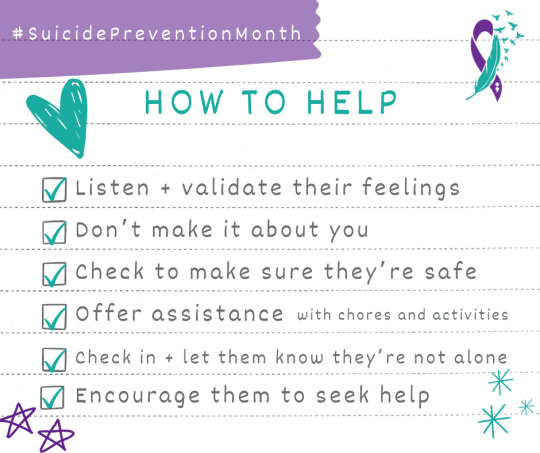
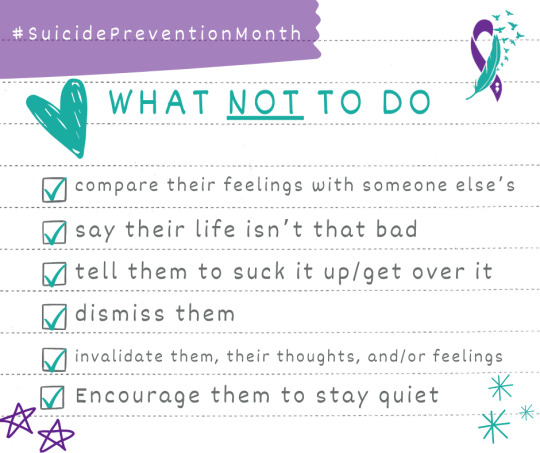
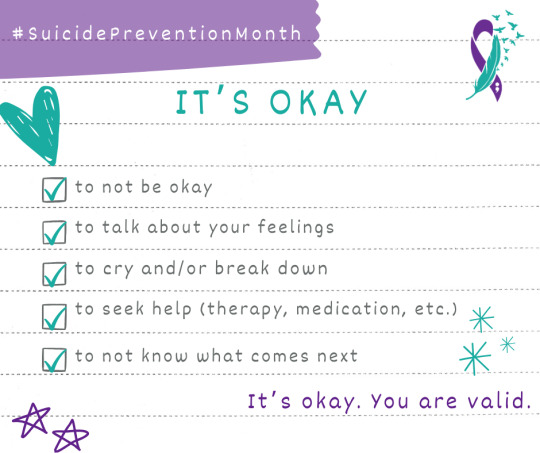
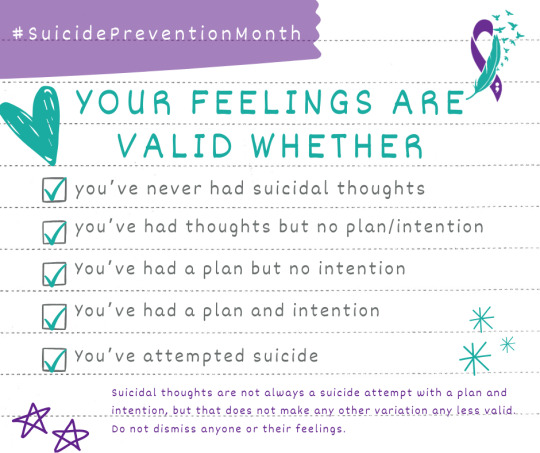

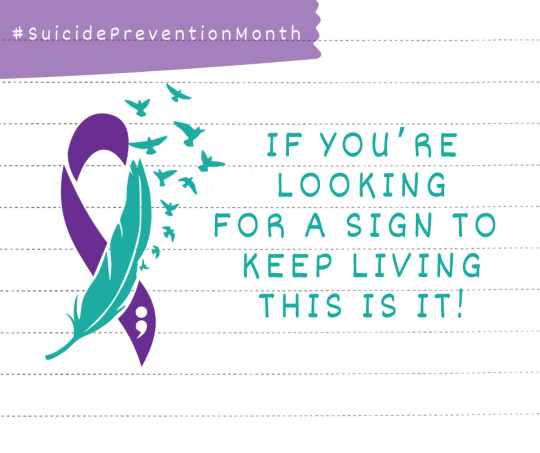
September is Suicide Prevention Month
Suicide is the most preventable form of death and yet the number of suicide victims rises each year despite increased awareness.
Why is that?
I can't answer it for everyone, but from what I've seen in my life, although people are aware, they don't understand.
I am a suicide surviver. Although I have not attempted suicide in over a decade, the thoughts linger from time to time. Sometimes it's just an intrusive thought that I can let go of. Sometimes it's a lot more and it is a lot more dangerous, but I am trying every day and that is all I can ask of anyone.
I am grateful to have found support here/online. However, people in my own life continue to belittle and invalidate my feelings. That makes me feel isolated, alone, and like there's something wrong with me. It makes me feel like I have no value.
I imagine it's hard to understand what goes through a person's head when they're suicidal if you've never felt that way. It's hard to validate someone's emotions when you (as an outsider) can rationalize them. But the problem with that is, those people don't know and they can't understand how those thoughts actually feel.
I am a very logical and rational person most of the time. However, when my depression is bad, I can't think rationally. The dark thoughts are consuming and I believe them. I know it's the depression talking. I know it's my anxiety talking. I know it's the past trauma I suffered haunting me. And yet, I still can't control those thoughts.
Those people who have never felt that way, think that rationalizing things, sharing comparing stories, or reminding you your life is good will help, but it doesn't. Not in those moments. That's what people who don't suffer have to understand.
I can try to explain that. I can raise awareness. I can shout from the rooftops trying to get people to understand. But the fact is, I can't make anyone change their thinking if they don't want to.
Suicide is a tragedy.
However, being suicidal is seen an inconvenience or a a way of "seeking attention." It is dismissed.
The same people who will cry over a friend's suicide, and wonder how they didn't see it are the same people who will tell the next person to "get over it", "your life's not that bad", "when I was in your situation..." They either don't see it or they don't care enough and that is the problem.
Suicide is preventable, but not without support. Support requires people that are not suicidal to better educate themselves beyond awareness to understanding and how to help.
You would never tell a cancer patient they're being dramatic and looking for attention when they share their struggles. You would never tell someone having a heart attack to "get over it." You would never belittle a mother who suffered a miscarriage by comparing them to someone else.
So why do that to someone suffering with mental health struggles?
Yes, there the stigma surrounding mental health and medication is improving, but we have a long way to go. That starts today and every day after.
Raising awareness is fine, but raising understanding is necessary meaningful change.

#suicide#tw:suicide#suicide awareness#suicide prevention#suicide prevention month#suicide awareness month#mental health#mental health matters#self care#lovealexhunt#about#get help#mental health support
273 notes
·
View notes
Text
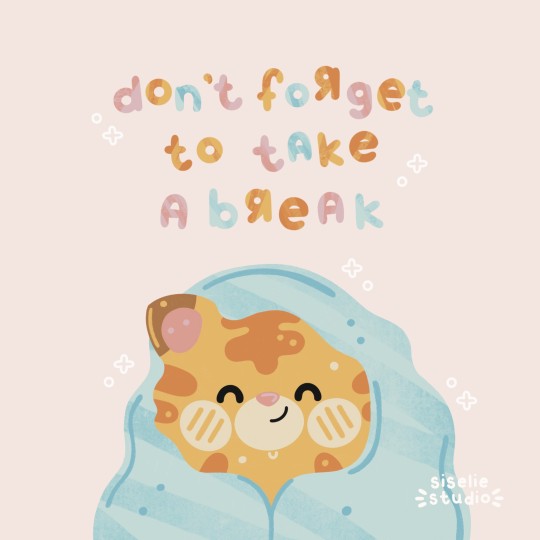
a quick reminder for everyone who needs to hear this 🥰
#illustrators on tumblr#don't forget to take a break#take a break#cute art#digital art#digital illustration#kawaii art#digital doodle#kawaii#illustration#cute kawaii#siseliestudio#self care is not selfish#self care is important#self love#burn out prevention#relatable art#tiger#stylized art#alt text in id#alt text#my art#happy art#cozy art#original character#oc
155 notes
·
View notes
Text
Living with Body Focused Repetitive Behaviors
Me: *Is super stressed over life.*
Trichotillomania: Time to pull some hair! C'mon. You won't even notice you're doing it. It'll make you feel better.
Me: NO. *Spends 4 days putting hair in a mini twist protective style* There.
Dermatillomania: Hey. Your hands are free. And restless. And dry... Pick your skin. Bleed. Bleed.
Me: Stop! *Starts up a new crochet project to keep hands busy.* Ok cool.
Onychophagia: Hi hi. Your nails are.... perfect biting length... you should do that.
Me: Noooooooooooo *Paints nails.*
Dermatillomania: Oh look, you got some nail polish on your skin. Pick it off... now pick some more...
Me: SDJAKFDSJFKLDKAFDJKLAFJDKSAKLFDASL
#is this tmi? oh well. this is the tmi website#trichotillomania#dermatillomania#onychophagia#bfrb#body focused repetitive behavior#ocd#guys guess what? my therapist all but prescribed that i get a manicure to prevent picking at my skin#apparently after a year with this therapist i never mentioned my finger picking until this week#and she was like 'ok since you find it tough to paint them yourself get a manicure. self care and preventative'#because my cuticles are horrific due to me constantly picking at them and the sides of my fingers#so i've always been too embarrassed to go to a nail salon and my therapist was like 'exposure therapy!'#currently my nails are sloppily painted because i can't hold a brush still and they're already chipping after like 5 days#actually they probably started chipping on the second day honestly.#i need to redo my twists a bit which actually satisfies the trich urges since i'll be running my fingers through my hair to do it#but i won't actually be pulling. but also. i will be getting the shed hairs out. so. kind of fulfills that.#but right now my nails are long enough for me to feel them sometimes hit my keyboard. which. isn't normal for me.#and despite the nail polish i feel the urge to bite them shorter ahhhhh#anyway if you're Black with natural hair and have trich i HIGHLY suggest mini twists since it helps deter me from pulling#sure i have to redo it every few weeks but seriously. game changer. harder to find individual hairs to pull.
126 notes
·
View notes
Text
if you're having a bad day:
you're still loved
you tried your best
you have what it takes to get past this
you have support available should you need it
it is okay to feel overwhelmed
please cry if you have to
if it affects you, it is important
#mental health#mental health awareness#mental health reminders#mental health support#positivity#reminders#therapy#wellness#coping mechanisms#coping#mentalheathawareness#mental heath support#self care#prevention#care#hope#kindness
554 notes
·
View notes
Text
this is not at all an original thought but Renegade by Big Red Machine featuring Taylor came up on shuffle and I got the immediate vibe (again) that this song is essentially Rooster and Hangman’s dynamic in TGM from Jake’s POV.
#think about it#talking about how the other person has all this baggage#and that they struggle but is it really they’re struggles that are preventing them from giving you everything you need in the relationship#or are they just apathetic to the relationship#and that internal struggle of feeling like you’re asking too much of your person#but are you really?#and this person’s self flagellation and anger at the world#is hurting you too#do they realize that?#do they know that they’re hurting you too and they just don’t care?#or are they just so in their head they don’t realize what this dynamic is doing to you#anyway#sorry for the novel if anyone reads this lol#just a thought that’s not at all original#hangster#top gun maverick#headcanon#song inspo#jake seresin#bradley bradshaw#rooster#hangman#bradley x jake#rooster x hangman
9 notes
·
View notes
Text
you'll never feel ready, and while there's fear and anxiety in that, there's also a decent amount of freedom and joy. you'll never feel ready, but that won't stop life, and whatever needs to happen will, and you'll survive it. you'll outgrow it, and the version of yourself you thought you were. you'll build yourself up from the scratch, and you'll start again. and then again, you won't feel ready, but with uncertainty there's possibility, and adventure, and hope. just make sure you're there for the ride! keep it going, baby, you got it!!💛
#gentle reminder#note to self#advise#friendly reminder#reminder#friend#mentalstrength#loveyourself#self help#self improvement#selfworth#self healing#healingjourney#healing#self esteem#self worth#self care#self love#self guidance#guidance#advises#friends#suicide prevention#mental health support#acceptance#self compassion#compassion#soft reminders#patience#mistakes
111 notes
·
View notes
Text
the projected results for germany are fucking dismal
#ctlyuejie writes#eu elections#idk if there is analysis already but i will never understand how nominally center to left parties move more and more to the right#(especially on immigration issues) to appease some kind of 'consensus' on these issues for the nth time#and AGAIN do not recognize that they are alienating what is their actual base#actually checked whether i could vote closer to my interest with the pirate party or more left wing parties#but alas...they're not doing much better in terms of policies#will end up voting in the same block anyways#and there is a chance they get an awkward number in votes so that mine isn't as effective#heartened by the anti-right wing protests happening almost every weekend#but it does feel like getting hit over the head repeatedly with how that isn't only necessary but also couldn't prevent the amount of votes#right wing parties are getting right now#always careful with how much of an argument for a self-own the rejection by the front national is#but the fact the german right wing got rejected by the right wing block in the eu parlament towards the end#does tell a certain story on how bonkers their 'politics' are#the more cynic reading is that more center and left wing parties do not actually care that they are alienating the base as long as the base#still votes for them begrudgingly (sp?) and they either gain a phantasy of an eco fascist vote#or don't care about racism etc that much on a party leadership level#met my ex roommate yesterday and we were talking about her travelling through germany#and she just remarked how many foreigners are at this one city's central station and how that's different to the south#and i was just like...'so?'
12 notes
·
View notes
Text
In honor of September being suicide prevention month, here are some ways to help your depressed/suicidal friends:
-"I'm glad you exist" texts go a long way, but "I love that you do (insert specific action)" and "my favorite thing about you is ()" texts go further. Be specific. It's hard to see yourself in any good detail when you're suicidal
-Text them. Incessantly, if you have to. Small "I miss your face" and "this reminded me of you" texts. I've known people who have said "if nobody talks to me/contacts me/takes interest in me today, that'll be the sign to kill myself" and a text genuinely saves lives.
-Help them discover and rediscover hobbies. When you're depressed, the first thing to go is your motivation, and finding things that bring you any amount of satisfaction is important. Offer to volunteer at an animal shelter with them, or put together a little scrap book, or go somewhere scenic to take pictures.
-A lot of suicidal people are known to self harm. If you notice these tendencies (scratching, picking at skin, rubbing or putting pressure on body parts, etc.) you can be subtle about helping them. Hold their hand so they don't scratch, or offer a hair tie to snap against their wrist, or ask to draw on them. All these things are super helpful without being obvious or embarrassing.
-If they're known to be suicidal, you don't have to talk about it unless it's obviously concerning. A lot of people who attempted don't want to relive it, even if they're in a better place than they were.
-Join in on simple self care needs: go out to eat with them, or grab food to eat elsewhere if they're anxious to eat around people, go swimming if showering is hard, have a little sleepover like you were both kids and do all the basic activities (brushing teeth, changing into pajamas, eating dinner etc.) together. This is best if you're really close to the person, but there are also ways to do this if you aren't super close.
If you have anymore, please add them! These are just the ones I've gathered both as the depressed person and the caretaker, but I know there are plenty more.
#ab rants#suicide awareness#suicide prevention month#september#suicide#depression#self care#caretaker#caretaker advice#suicide prevention#suicidal ideations#self harm#self harm recovery
7 notes
·
View notes
Text
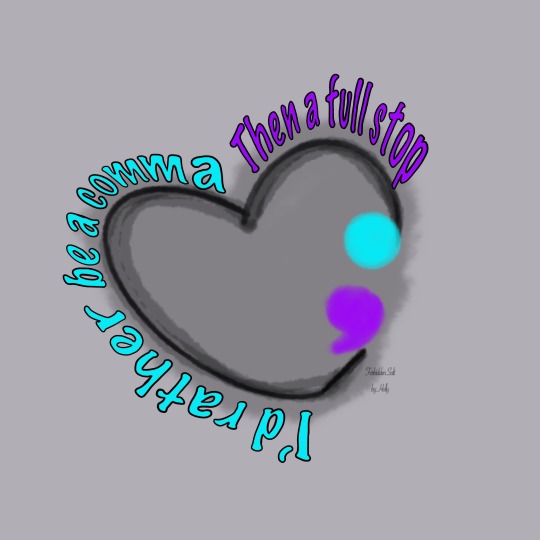
Breaking the Silence; My Mental Health Story for Worldwide Suicide Prevention Day
By ForbiddenSalt
9/10/2024
Trigger Warning: This blog post discusses suicidal ideation, depression, and mental health struggles. If you are in a vulnerable state, please read with caution, and know that support is available through resources like 988, friends, and loved ones.
Resources and helpful tools for self and loved ones provided below the fold.
My Story:
Suicide Awareness Day holds a deeply personal meaning for me. For years, I struggled silently with suicidal thoughts, depression, and anxiety, unsure of how to ask for help or whether I deserved it. Sharing my story now is not just about raising awareness, but about offering hope to anyone who feels the same weight I once carried.
At the age of 13, I began to experience something many people are hesitant to talk about—suicidal ideation. But it wasn’t until I was in college that I truly realized how dangerous those thoughts had become.
I remember one day when I was walking across campus from class to my dorm, lost in thought, and accidentally stepped off the curb without looking. A car was coming toward me. Instinctively, I jumped back, avoiding an accident. But what happened next startled me more than the near-miss. As I stood on the sidewalk, tears welled up, not because I was relieved, not because I was scared—I was upset that my instincts had saved me. I realized I wasn’t crying because I had narrowly avoided getting hit by a car; I was crying because, in that moment, I wanted to be hit. It would have been an "accident"—a way out without me having to act intentionally.
It dawned on me that this was something much more serious than I had admitted to myself.
This wasn’t the first time I had experienced suicidal thoughts, but it was one of the most shocking moments. I knew I needed help. I sought out a counselor at the campus health center and, for a time, tried therapy. When I went home for a break, I spoke to my doctor, and she prescribed me an SSRI. I confided in my family and was met with mixed reactions—some were supportive, while others expressed concerns about the medication, urging me to stop taking it as quickly as possible. This set up an internal battle for me; I began starting and stopping my medication over the next few months, caught between fear and shame; and eventually quit all together.
Suicidal ideation lingered in the back of my mind for years. I wished for a pause button, a way to make the world stop so I could catch my breath and somehow not fall behind. I dreamed of getting hurt or sick enough to be hospitalized, just so I could take a break from life’s demands. But I never let myself act on those thoughts.
It wasn’t until my mid-20s that things got so bad I returned to therapy. This time, it was different. My new therapist helped me understand that I wasn’t “crazy”—I was carrying the weight of childhood trauma and years of struggling to survive. She diagnosed me with complex PTSD, and for the first time, I felt understood. Her support gave me the strength to make significant changes in my life, including moving to a new state.
There, I found another therapist who continued to guide me through the ups and downs. I started back on an SSRI and have stayed on it ever since. Through this process, I realized that what I had been dealing with wasn’t just emotional—it was also biological. My body wasn’t producing enough serotonin, and my chronic illnesses, were compounding these mental health struggles by denying my body the tools to make its own serotonin and through the weight of the symptoms. Especially for a while before there was any answer or treatment plan in sight.
I went through EMDR therapy, talk therapy, and put in the hard work to heal. I focused on my physical and mental health, fighting for answers and for my life. Slowly, I began to reclaim control. I started to recognize the warning signs of passive suicidal ideation and created an action plan for when those thoughts creep in. I don’t go to therapy as often now, but I still have touch-base appointments in case something changes.
Through this journey, I’ve learned so much about myself and the nature of mental illness. Depression, anxiety, and PTSD were not signs that I was lazy or difficult, though I was often labeled as such. They were symptoms of a much deeper issue. I wish people could see that depression isn’t a mindset or mood and suicidal thoughts are not selfish—they are the final, fatal symptom of a disease.
It took a long time for me to accept that what I went through wasn’t my fault. I wasn’t to blame for the trauma I endured or the way my brain and body responded to it. And if you’re reading this and find yourself in a dark place, I want you to know you are not alone. I know what it’s like to stand in the darkness for so long that it starts to feel like home. But I also know that it is possible to fight back, to heal, and to find hope again.
If you can’t fight for yourself right now, I encourage you to reach out to someone—anyone—who can sit with you in your pain. Let them help you find a therapist, a doctor, or simply help with daily tasks. It might not be the person you expect. For me, one if my company leaders had noticed my depression and helped me find a therapist. I had a best friend who sat with me over the phone while I sobbed broken hearted, encouraging me to seek help if I needed it. That going to the hospital if I needed it wasn’t shameful or weak but brave and admirable. It was my grandmother, who spoke to me daily, reminding me of my faith and offering love when I couldn’t love myself and felt those I loved most didn’t love me.
Faith also played a huge role in my healing. I’ve had my share of questions and anger, but my belief that God could handle my questions and my rage helped me through some of the darkest times. I questioned why my life was going the way it was, why I was feeling the way I did, if He knows everything before it happens, if he’s all powerful why didn’t he step in to change the course of my life away from this. My questions turned to anger and I had to keep reminding myself that God had shoulders big enough for my anger, my tears, my pain. That I could toss all of it at him and he’d still see me still, love me. I never doubted his existence, and honestly to this day I still don’t have all the answers but I’m sure one day I’ll understand and I’ve realized I was still loved even when I couldn’t see it.
My family eventually came around too. Even my dad, who I had thought didn’t believe me, recently admitted how scared he had been for me after he had kept his fears hidden for years since it had gotten bad. We were able to talk and he listened, shared his point of view, and made the effort to understand. He allowed me to assure him I was safe now, I was doing better, and it’s changed our relationship for the better. While I had found my way to stability without knowing if my family believed or supported me, learning my family did care enough to worry, cared enough to learn, and loved me enough to listen even if what I said was hard to hear meant the world to me.
If you’re struggling, know that there is help out there. Call 988 for support, reach out to friends, hug your dog or cat, cling to your faith—whatever gets you through the next moment. Each day is a step, and that’s enough. It doesn’t have to be a leap—it just has to be forward.
Resources for support below:
Here are some coping strategies:
1. Box Breathing: This simple technique can help reduce anxiety. Breathe in for four counts, hold for four, exhale for four, and pause for four. Repeat until your heart rate slows and you feel more grounded. You can do this while on a video call too just let your eyes glide along the edges of the screen while you hold and breathe.
2. Straw Breathing: Another great calming tool—take a deep breath in, and then slowly exhale like you’re blowing through a straw. It mimics the relaxing response of the parasympathetic nervous system and helps you focus.
3. Journaling: I started journaling, reminding myself it didn’t have to be perfect. It was just for me. I stopped feeling guilty if I skipped days or weeks and let the words flow when I needed them. If you struggle with journaling, try creating an anonymous blog where you can rant and vent without worrying about dates or continuity. I have a separate Tumblr just for this—a void I can yell into when I need to.
4. Bilateral Stimulation: Butterfly taps—crossing your arms and tapping on opposite shoulders—helped calm me during moments of stress. This was especially useful during EMDR therapy, which became one of my strongest tools.
5. Creating a Routine: I used to go to the gym to cope before my chronic illness made it harder, so I shifted to art as a form of expression. Creating anything—whether it’s a routine or a creative outlet—can make a difference.
6. Boundaries and Emotions: Learning boundaries and reconnecting with my emotions was vital. One book that really changed my perspective was Rage Becomes Her by Soraya Chemaly, which helped me embrace my anger as a valid emotion. Learn how to advocate for yourself and establish boundaries. This takes time, but it’s one of the most empowering things you can do for your mental health.
7. Prioritize Yourself: Make time for what you need—therapy, the gym, a bath, or a doctor’s appointment. And allow yourself to rest. Your mind and body will force you to stop if you keep ignoring the warning signs.
8. Taking Shortcuts: Too tired to make a proper meal? That’s okay. Eat food however it comes—deconstructed meals are all the rage anyway. I’ve had moments where lunch was just handfuls of cheese and lunch meat. The goal is to nourish yourself, and sometimes that means being kind to yourself about how you do it.
10. Create Safety Nets: If you're heading somewhere that could be triggering, plan for it. What’s your exit strategy? Can you bring a comfort item, like a fidget toy, a blanket, or a stuffed animal? Having a plan can give you a sense of control.
11. Redirecting Negative Thoughts: When I get caught in negative thoughts, I ask myself if these thoughts are helping me process emotions or if they're just hurting me. If I’m not ready to process them, I work on redirecting my focus to something more helpful.
13. Emotional Support Animals: If you can, get an emotional support animal. My mini schnauzer has helped me through so much, even though she doesn’t know it.
How can I help a loved one:
1. Listen First: Before jumping to solutions, take time to listen. Validate the person's feelings, and let them process before suggesting how to fix things. Most of the time, they already know the solution; they just need space to work through it.
2. Stop Shaming Mental Health: Be mindful of how you talk about mental health. I’ve overheard loved ones shaming people for being "selfish" or "foolish" for being depressed, anxious, suicidal and even those that did commit suicide not knowing how often it was on my mind. Those words made it even harder to speak up and ask for help.
3. Fear and Guilt Are Not Helpful Tools: Fear and guilt are not effective motivators when it comes to mental health. I once told someone close to me that I didn’t believe people who commit suicide go to hell. Just as someone who passes from cancer doesn’t go to hell for how they died, I believe the same for depression—it’s an illness. They responded that they hoped fear of hell would keep me from acting on those thoughts. I explained that, by the time someone is ready to act, they likely don’t care anymore. The weight of the pain is overwhelming, and fear or guilt won’t pull them back.
4. Recognize the Signs: Suicidal ideation, passive suicidal ideation, and suicidal plans are all dangerous and need treatment and support. It may begin with passive thoughts like, “I wouldn’t mind if I didn’t wake up tomorrow,” but those can shift into active planning if left unchecked. Just because someone hasn’t acted on it doesn’t mean they don’t need help. Depression doesn't always look the same for everyone. It could be messy rooms, low energy, or a lack of interest in things that once brought joy. It could also look like reckless behavior, withdrawing, or joking about death. These subtle signs shouldn’t be brushed off—they’re as important as overt cries for help and worth a check as little as “hey you keep making these jokes, I just want to make sure you really are okay?” If someone is talking about feeling hopeless, giving away possessions, withdrawing from loved ones, or engaging in risky behavior, these are red flags.
5. Offer practical support: Whether it’s helping with daily tasks, providing a ride to a therapy appointment, or just sitting quietly with them, practical support can be a lifeline.
6: Encourage professional help: Gently suggest therapy, medical care, or other professional help if the person hasn’t already sought it. Be patient and compassionate, understanding that reaching out can be terrifying for them.
7. Be present: Sometimes the best thing you can do is just be there. Your physical and emotional presence can provide comfort, even when there are no words.
If you have a loved one who you worry is going through something, or has confided in you and you are worried for them. Don’t wait. Speak to them. Ask them how you can help, what’s going on, listen. If you’re afraid for them, even after they have gotten to the other side, don’t let your fears tear at you for months, tell them then listen and trust that when they say they are good, have come out the other side have an action plan for when they notice the signs - belive them. If you can’t let it go still, seek your own support. The fear of loosing someone you care about is worthy of attention. If you’re reading this because someone you love is struggling with suicidal thoughts, thank you for caring. Supporting someone with suicidal ideation can be incredibly difficult, but your presence matters more than you might realize.
If you or someone you love is struggling, find Resources for Support:
1. National Suicide Prevention Lifeline: Dial 988 for immediate help in the U.S. Available 24/7.
2. Crisis Text Line: Text HOME to 741741 to connect with a trained crisis counselor.
3. The Trevor Project: Focused on supporting LGBTQ+ youth, The Trevor Project offers crisis intervention and suicide prevention services. Text START to 678678 or visit their website.
4. NAMI (National Alliance on Mental Illness): NAMI provides free, confidential support for mental health concerns. Call the NAMI Helpline at 1-800-950-NAMI or text NAMI to 741741.
5. The Jed Foundation: Focused on mental health support for teens and young adults, the Jed Foundation works to protect emotional health and prevent suicide. Visit jedfoundation.org for more information.
6. The Veterans Crisis Line: Veterans and their loved ones can call 988 and press 1 or text 838255 for confidential support. Available 24/7.
Suggestions for Keeping Yourself Safe:
1. Create a safety plan: Write down a plan for when suicidal thoughts occur. This could include calling a trusted friend, therapist, family, distracting yourself with an activity you enjoy, or going to a safe place where you can feel grounded and making an appointment with your doctor.
2. Reach out to a support network: Whether it’s friends, family, or a therapist, let someone know how you’re feeling. It’s important not to isolate yourself when you’re struggling.
3. Remove means: If you’re feeling unsafe, remove items that could be harmful or ask someone you trust to hold onto them temporarily. There is no shame in this ever.
4. Practice grounding techniques: When suicidal thoughts take over, try grounding yourself with techniques like deep breathing, focusing on your senses, or engaging in mindfulness exercises. These can help bring you back to the present moment. Call on your faith if you need to to get by, play with your pet anything to help you get grounded and move through the feeling
5. Remember that feelings pass: In the heat of the moment, it can feel like the pain will last forever. But emotions are temporary, and feelings—even the darkest ones—eventually pass. That feelings are normal and natural and have no moral judgement, feel it, acknowledge it, and let it move through knowing another feeling will come your way take its place.
Recovery isn’t pretty, and life isn’t perfect; but you are worth fighting for.

#mental health#mental health awareness#mental health matters#988blr#988#988lifeline#call 988#depression#anxiety#support resources#semicolon#;#suicideprevention#suicide prevention day#crisis support#self care#emotional support#crisis intervention#mental wellness#mental illness#mental health community#coping strategies#grounding techniques#health#chronic illness#chronic pain#disability#suicide prevention
12 notes
·
View notes